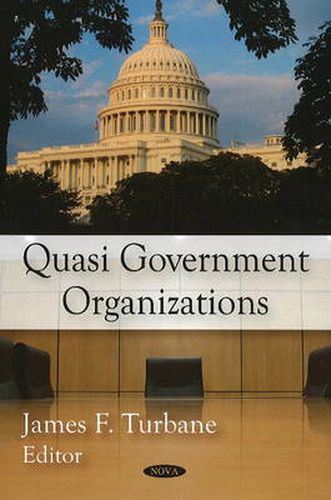Readings Newsletter
Become a Readings Member to make your shopping experience even easier.
Sign in or sign up for free!
You’re not far away from qualifying for FREE standard shipping within Australia
You’ve qualified for FREE standard shipping within Australia
The cart is loading…






The quasi government, not surprisingly, is a controversial subject. To supporters of this trend toward greater reliance upon hybrid organisations, the proper objective of governmental management is to maximise performance and results, however defined. In their view, the private and governmental sectors are alike in their essentials, and thus subject to the same economically derived behavioural norms. They tend to welcome this trend toward greater use of quasi governmental entities. Critics of the quasi government, on the other hand, tend to view hybrid organisations as contributing to a weakened capacity of government to perform its fundamental constitutional duties, and to erosion in political accountability, a crucial element in democratic governance. They tend to consider the governmental and private sectors as being legally distinct, with relatively little overlap in behavioural norms. Congress is increasingly engaged with the quasi government. The issues run the gamut from enacting legislation to encourage the creation of non-profit organisations to promote individual national parks, to proposals to strengthen regulation of government-sponsored enterprises such as Fannie Mae, to oversight hearings respecting national security issues at Los Alamos Laboratory. There is nothing modest about the size, scope, and impact of the quasi government. Time will tell whether the emergence of the quasi government is to be viewed as a symptom of decline in our democratic government, or a harbinger of a new, creative management era where the purportedly artificial barriers between the governmental and private sectors are breached as a matter of principle.
$9.00 standard shipping within Australia
FREE standard shipping within Australia for orders over $100.00
Express & International shipping calculated at checkout
The quasi government, not surprisingly, is a controversial subject. To supporters of this trend toward greater reliance upon hybrid organisations, the proper objective of governmental management is to maximise performance and results, however defined. In their view, the private and governmental sectors are alike in their essentials, and thus subject to the same economically derived behavioural norms. They tend to welcome this trend toward greater use of quasi governmental entities. Critics of the quasi government, on the other hand, tend to view hybrid organisations as contributing to a weakened capacity of government to perform its fundamental constitutional duties, and to erosion in political accountability, a crucial element in democratic governance. They tend to consider the governmental and private sectors as being legally distinct, with relatively little overlap in behavioural norms. Congress is increasingly engaged with the quasi government. The issues run the gamut from enacting legislation to encourage the creation of non-profit organisations to promote individual national parks, to proposals to strengthen regulation of government-sponsored enterprises such as Fannie Mae, to oversight hearings respecting national security issues at Los Alamos Laboratory. There is nothing modest about the size, scope, and impact of the quasi government. Time will tell whether the emergence of the quasi government is to be viewed as a symptom of decline in our democratic government, or a harbinger of a new, creative management era where the purportedly artificial barriers between the governmental and private sectors are breached as a matter of principle.